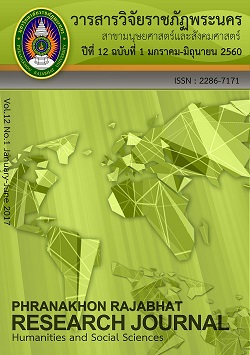อิทธิพลของสื่อสังคมต่อบทบาทการกำหนดวาระข่าวสารระหว่าง ผู้รับสารและสื่อมวลชนในการนำเสนอประเด็นสังคม
Main Article Content
Abstract
การพูดคุยและอภิปรายประเด็นบนสื่อสังคมหรือโซเชียลมีเดียมีบทบาทในการเปิดประเด็นสังคมที่เป็นที่สนใจและเป็นปัญหาในสังคมให้เป็นที่สนใจ การแสดงความเห็นต่อประเด็นจนพัฒนาเป็นกระแสเป็นการกำหนดประเด็นให้สื่อมวลชนต้องพิจารณาเรื่องที่คนบนโลกออนไลน์ให้ความสำคัญและนำไปรายงานบนสื่อกระแสหลัก ในบริบทของประเทศไทย พบการใช้สื่อสังคมเป็นพื้นที่ในการสื่อสารประเด็นสังคมโดยผู้ใช้สื่อออนไลน์ให้เกิดการรับรู้ในวงกว้าง และพบการนำเสนอข่าวของสื่อที่มีการหยิบยกประเด็นจากออนไลน์มานำเสนอ โดยมีการต่อยอดประเด็นจากกระแสบนออนไลน์ และการใช้ข้อมูลจากผู้รับสารเป็นตัวแทนเสียงของสังคม บทความนี้มุ่งศึกษากระบวนการในการกำหนดวาระข่าวสารโดยสื่อสังคม และการใช้ประโยชน์จากกระบวนการดังกล่าวในการผลักดันประเด็นสาธารณะเพื่อการเปลี่ยนแปลงให้สังคมได้ประโยชน์ กระบวนการศึกษาใช้การสัมภาษณ์เชิงลึก ผู้สื่อข่าวจากโทรทัศน์ หนังสือพิมพ์ และสื่อออนไลน์ และผู้ทรงอิทธิพลบนสื่อออนไลน์ที่มีบทบาทในการขับเคลื่อนประเด็นสังคมจำนวน 14 คน ข้อมูลจากผู้สื่อข่าวเพื่อทำความเข้าใจต่อเหตุผล ปัจจัย กระบวนการสื่อสาร และแนวคิดของสื่อต่อบทบาทการกำหนดวาระข่าวสารในยุคที่มีการใช้สื่อสังคมออนไลน์ในกระบวนการสื่อข่าว ส่วนข้อมูลจากผู้ทรงอิทธิพลบนสื่อออนไลน์เป็นการวิเคราะห์กระบวนการในการใช้สื่อออนไลน์กำหนดวาระข่าวสารเกี่ยวกับประเด็นสังคม ผลการศึกษาพบว่า การกำหนดวาระข่าวสารผ่านสื่อสังคมเป็นบทบาทร่วมระหว่างผู้สื่อข่าวและผู้ใช้สื่อออนไลน์ ซึ่งเป็นโอกาสของการผลักดันประเด็นที่ตรงกับความต้องการของสังคม กระบวนการกำหนดประเด็น คือ สร้างการรับรู้ ผลักดันกระแสให้เกิดการอธิบายประเด็นมุมมองที่แตกต่าง และผลักดันให้เกิดพฤติกรรมบางอย่างในสังคม รวมถึงการรณรงค์สู่การเปลี่ยนแปลงทางสังคมหรือเชิงนโยบาย ส่วนสื่อมวลชนทำหน้าที่ติดตาม คัดเลือกข้อมูลมานำเสนอ โดยเป็นผู้ให้คำอธิบายและหาทางออกต่อประเด็นต่างๆ ให้สังคม จึงจะทำให้เกิดประโยชน์ต่อการผลักดันประเด็นสังคมสู่การเปลี่ยนแปลงร่วมกัน
Social media conversation can play an important role in addressing the issue of public concerns and opinions to mainstream media. In Thailand, social media function supporting discussion and content sharing empower public to communicate on issues and problem widely and they can set public agenda toward issues or event by themselves. User-generated content is also used by traditional media to represent voice of public and provide information. This paper attempts to answer the question of agenda setting process by social media and how the process can drive social change and benefit the public. In-depth interviews were conducted 14 informants including journalists of mainstream media and online influencer who raise issues via social media. The purpose of interviews with reporters and editors from newspapers, broadcast and online newsrooms to understand reason and factors that social conversation and story leads its way to mainstream news coverage, and journalists’ conceptualization of agenda setting and gatekeeper role. Interviews with online influencer aims to understand their perception on setting agenda and public debate driving by people on social was media to set mainstream media topics to cover and report for wider audience. The result shows that process of agenda setting by online users happens when online users and online influencer telling and explaining issues that lead to social conversation and collective action. Online influencers play important roles on spreading network of information and put issues on awareness and debate. Meanwhile, journalists monitor and get hint from online conversation and cover public issues responding to people interest. Both journalists and online insist that agenda setting by journalists is still important and journalism should embrace ‘explainer and solution provider role’ more effectively to drive public issues and debate to social change.
Article Details
Each publish articles were copyright by Phranakorn Rajabhat University
Any contents which appeared in each articles in the journal were authors personal opinion. It did not relate to Phranakorn Rajabhat University and other instructors in the university. Each authors would take responsibility on their articles. If there are any mistake, the authors will take responsibility themselves
References
Mathes, R., & Pfetsch, B. (1991). The role
of the alternative press in the agenda-building process: Spill-over effects and media opinion leadership. European Journal of Communication, 6(1), 33–62.
Protess, D., & McCombs, M. (1991).
Agenda Setting: readings on media, public opinion, and policymaking . Hillsdale: Lawrence Earlbaum.
McCombs, M. (2004). Setting the Agenda:
The Mass Media and Public Opinion. Cambridge, UK: Polity Press.
Vliegenthart, R., & Walgrave, S. (2008). The
contingency of intermedia agenda setting: A longitudinal study in Belgium. Journalism & Mass Communication Quarterly, 85(4), 860–877.
J., & Wanta, W. (2008). Intermedia Agenda
Setting in Television, Advertising and Blogs During the 2004 Election. Mass Communication and Society, 11(2), 197-216.
Lim, J. (2011). First-level and second-level
intermedia agenda-setting among major news websites. Asian Journal of Communication, 21(2), 167-185.
Bradshaw, Paul. 2012. Model for the 21st
century newsroom redux. Accessed May 13. Available on Leanpub.com. https://leanpub.com/21stcenturynewsroom.
Adriaan van Bart (2013). Connecting data:
agenda-setting through connection. An investigation of the agenda-setting function in a social media context. Utrecht University


